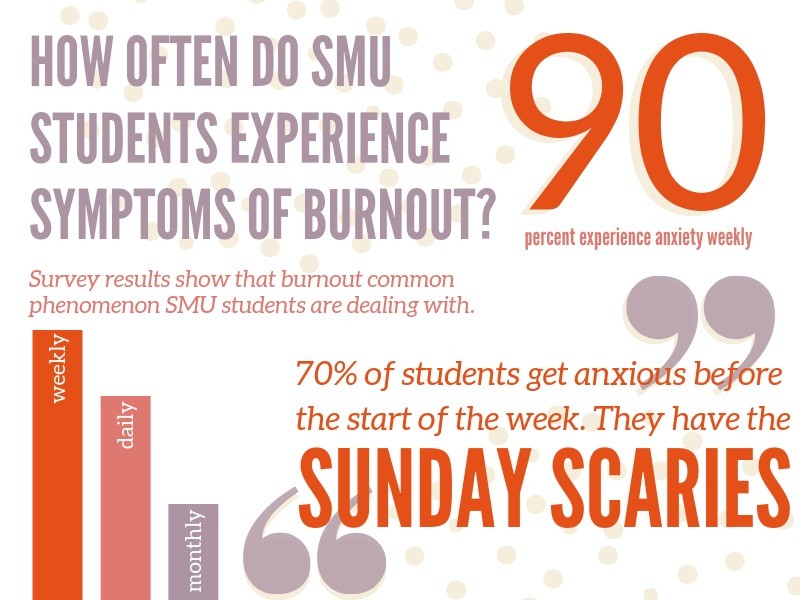Hannah Miller wakes up at 5:30 a.m., reads the news on her phone, gets out of bed, and goes to SMU track and field practice. She runs for two hours, showers, gets dressed, and grabs breakfast before she’s stranded in class until lunch. She spends her afternoon doing homework or back at track practice. She sticks to a strict routine because, without it, she wouldn’t be able to manage the stress of her commitments.
“I try and, you know, keep things ordered and stick to a routine so I don’t get too overwhelmed or too stressed,” Miller, a journalism and political science double major, said in an interview outside of Hughes-Trigg Student Center.
She isn’t the only student who feels overwhelmed by commitments. In a survey of 50 SMU students, 45 percent reported that they experienced a sense of burnout. 90 percent of respondents said they experience anxiety on a weekly basis, and 70 percent said the “Sunday Scaries” overwhelm them as they look at how many things they have to juggle throughout the coming week.
“I have a lot on my plate,” Miller said. When she was a freshman, stress motivated her. Now, as a senior, Miller finds that stress causes her to procrastinate and distance herself from her commitments.
This pattern of procrastination isn’t limited to SMU students, or college students in general. In 2019, the International Classification of Diseases determined that burnout is a workplace phenomenon. The symptoms of burnout include exhaustion, distance from responsibilities or commitments, and reduced ability to function whether at work, home or school.
Bailey Peterson, a full-time SMU student-athlete and junior, is constantly aware of her busy schedule. Every week, she spends 15 hours in classes, 20-plus hours committed to SMU’s rowing team, multiple meetings for the health awareness programs she leads, and she maintains a normal social life. Peterson’s burnout is magnified by the countless notifications, emails, texts and phone calls she receives throughout the day.
“Every time I pick up my phone and look at my screen, it’s reminding me that I have these things to do,” Peterson, an applied physiology and health management major, said during an interview in Fondren Library.
Technology may be one of the greatest contributors to everyday burnout. With smartphones, tablets and increasingly smart laptops, young people constantly check email, social media, receive texts from bosses, colleagues and class-project teammates, get notifications from school apps and even learning-centered apps. The number of notifications in the average 20-something’s life make it impossible to be bored. In fact, we’re too busy to be bored.
According to a 2018 report by the Pew Research Center, experts in media usage are beginning to wonder if constant connectivity is hurting society more than helping it. They’re also wondering if we can ever go back.
“Time previously spent dealing with boredom – daydreaming, contemplating, etc. – is now spent tethered to one’s phone, which is not relaxing and eventually makes my thumbs hurt,” according to one of the professors interviewed in the survey.
We can check email, communicate with friends, and enjoy social media on our phones. We can download an app to track our water intake, learn a language, find a recipe, turn in an assignment for school, Google search whether cold symptoms are actually the flu, and manage a fitness routine.
Everyone is doing a lot of things at once. Our constant connectivity coupled with our endlessly busy schedules leaves us worn out and without time to relax.
“I do have a lot of stress right now,” Peterson said in an interview in Fondren Library.
Social media contributes to stress not only because it wastes time, but it increases the feeling of being further behind your peers in their success. It’s not traditional fear of missing out (FOMO0, like when you see your friends are at brunch without you, but it’s the fear of missing out on opportunities, recognition and a sense of purpose.
Hannah Miller notices this when she scrolls through social media, especially because she’s in her senior year and preparing for life in the professional world.
“Social media, and just seeing what your friends are doing, can kind of stress you out too,” Miller said. “In senior year, everyone’s doing amazing things — which is only a portion of their life — but you’re like, ‘I have no plan.'”
Katie Lei, a junior finance major, said that college amplifies the expectations we have of what our lives should look like. She doesn’t believe that life after graduation will be as stressful.
“I think college sets unrealistic expectations for life after college,” she said.
The majority of college students — no, the majority of the world — feel overwhelmed by stress, it’s encouraging to see experts recognizing stress and burnout as legitimate health issues. The good news is, most of us feel this way. The less-great news, there’s not one prescription to cure stress. Everyone has to go through a process of trial and error to find the best way to cope, and the best way to thrive.
When Miller is overwhelmed, she removes distractions. She turns off her phone, avoids social media, and focuses on one task at a time. She repeats a simple mantra: “You can do anything, but not everything.”
SMU Junior Chanyang Park, a biology major with plans to attend medical school, has a more straightforward strategy: he simply doesn’t worry.
“I don’t worry about small stuff,” he said. “The less things you worry about, the less stress you’ll be in.”







